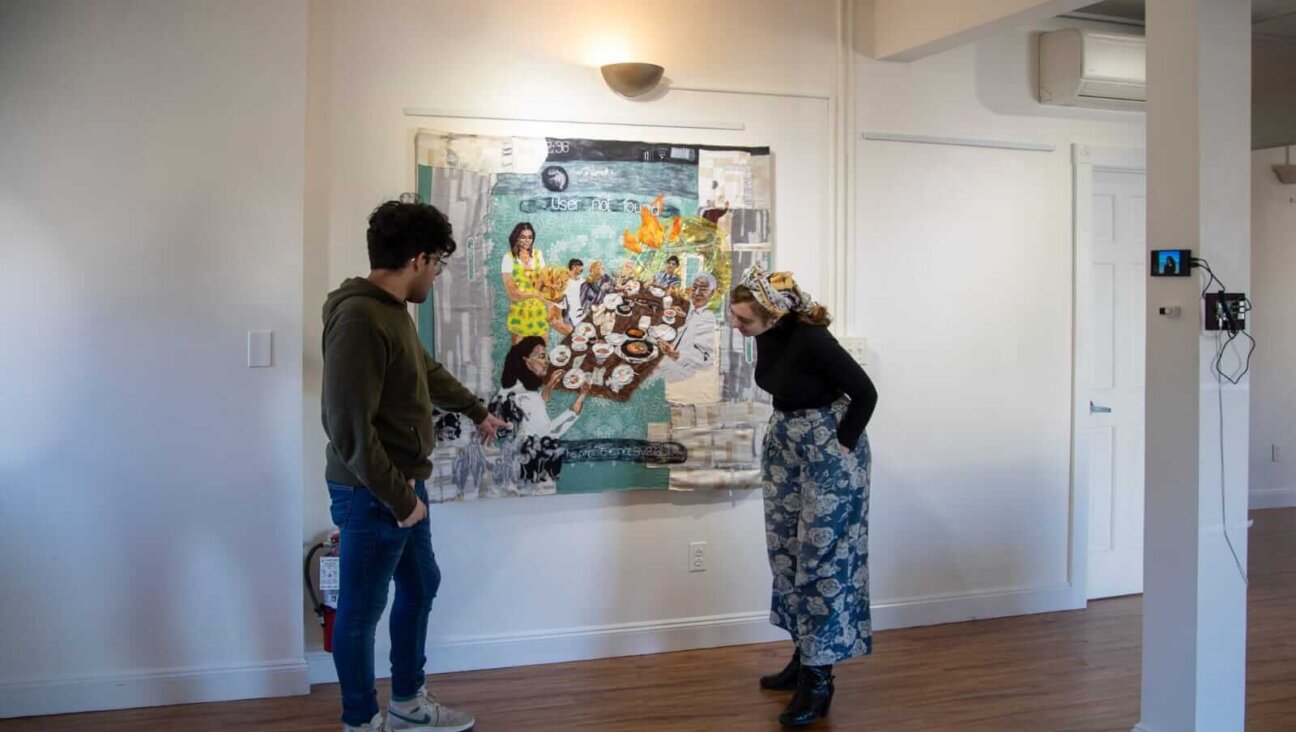Michael Twitty, Black Jewish Foodie, Talks ‘Culinary Justice’

Image by courtesy of michael twitty
(Haaretz) — “Only as a Jew [wearing a skullcap], white women offer me rides wherever I am going. I’m like, ‘White woman, you know I am black, right?’” With that sarcasm-laced remark, Michael Twitty won the hearts of the dozens of students who had gathered on a cold Thursday afternoon in November to hear the historian of Southern food talk about his unusual life. The host was the Jewish studies program of Harlem-based City College, a campus of the City University of New York.
Twitty, 37, grew up in Washington, D.C. A cook and culinary historian, he is African-American, openly gay and a skullcap-wearing Jew. At present he is in Israel where he will be giving a master class in cooking on Sunday as part of the annual Jewish Film Festival at the Jerusalem Cinematheque (one of its themes this year is culinary theater).
Twitty is currently at work on a book he has titled “The Cooking Gene,” a historical survey of the cuisine of the American South. He’s been teaching in Hebrew schools for 12 years, preparing boys and girls for their bar or bat mitzvah in Orthodox, Conservative, Reform and Reconstructionist synagogues. (He switches skullcaps to meet the head-covering style of each stream of Judaism.) Twitty also takes part as an actor in historical reenactments at Southern plantations, dressed in slaves’ clothing and cooking like his ancestors did.
Confused about his identity? He will do little to put you at ease, because this is who he is; if you can’t handle it, you don’t interest him. “Recently, when I was in the process of selling my book – HarperCollins bought it – another publisher, who shall remain nameless, they loved the idea of me talking about food and cultural roots and introducing my family tree and culinary justice,” Twitty tells the City College students. (In the college’s Jewish studies program there are many Arabs, blacks and Latinos – in fact, 95 percent of the students are not Jewish.)
“But the editor who made the final decision on whether the book will be published or not – she basically said, ‘Okay, what about this Jewish part? Can we just get rid of that?’ And she basically told my agent: We will give him a fabulous book deal if he just won’t wear his kippah in public, or talk about it in any radio interviews. And I said, I hope you told them to … And she said: Yes, I told them you won’t go for that. I said you’re damn right.”
He adds, without a trace of rancor: “Black guy, heritage, food justice, ghetto people, eat broccoli – that was cool, but me being complicated and Jewish and all that other stuff was not cool, not marketable, I was, quote, ‘muddying the waters.’ This is America, the water has been done muddy. And [the publisher] said something on the phone, with a nervous laugh: I don’t think America is ready for someone like you. F–k you, I am America. It infuriated me, because this woman was Jewish and she said, ‘Jews don’t read our books. Jews don’t buy our books.’ It’s this box again, I will put you in this box – if you complicate it I don’t know what to do with you.
“I have a struggle with people who are trying to put me in a box, with people who are trying to break me down according to what makes sense to them. ‘Are you Ethiopian?’ From black people: ‘Are you a Hebrew Israelite brother?’ ‘No, I’m Jewish.’ ‘How are you Jewish?’ ‘You know, three men took me into a little room, and I got dipped in the water, this is how I’m Jewish.’”
The conversion was in 2002, when Twitty was 24.
Kugel with peaches
From an early age, Twitty recalls, when he visited friends’ homes, he wanted to talk to their grandmothers and see how they cooked. Over time, he became a walking historian of Southern cooking. Later, he started to interview Jewish grandmothers and find out what happened to Jewish cooking when it arrived in the American South.
“I do go to Jewish houses all over and collect knowledge about food recipes,” he relates with unabashed pride. “I am the walking memory. A lot of the kids I teach don’t connect with their grandparents. Growing up, I would go to someone’s house and I wanted to meet the grandmamma, to ask questions and see how she cooks. I learned to ask the proper questions.
“Always watch the hand. Don’t look at the face. Don’t look at the mouth. Watch the hand. All the grandmothers cut with their hands. The tomatoes – [if] you and I will do it we will lose a hand, they just cut. A lot of times I found myself being the culinary memory of a family. I asked a friend one time, what do you put in a matzo ball, and he said cinnamon, and meat. So I said, ‘Oh, your people were from Lithuania.’ He said, ‘How do you know?’ I said, ‘You tell me [how you prepare] the kneidlach soup, I tell you where you’re from.’”
In New Orleans, Twitty met the Miriam Covert, co-author of the “Kosher Cajun Cookbook,” he tells me as we sit in an Ethiopian restaurant in Harlem, partaking of fresh injera, a sourdough flatbread that the Ethiopian kitchen serves with every meal.
“[Covert told me that] her mother tried to eat a banana whole, because she had never seen a banana. She didn’t trust tomatoes because she thought they were vegetables made of blood. She said to me, ‘With ideas like that, who do you think we learned to cook American from? The black ladies were our neighbors in New Orleans. All of the Jewish households, either a black person worked there, or they were your next-door neighbor. And that’s how we learned how to cook Southern, that’s how we learned to cook American. We didn’t know that the food that we were eating was anything else but American, we though this is how Americans eat.’ They thought okra and gumbo and jambalaya and black-eyed peas was what everyone’s eating, they didn’t know they were eating a West African-influenced diet.”
Twitty goes on to explain that, in the next stage, “among these Jewish households in the South that had black cooks or were influenced by the black presence, they started mixing things up. So they don’t eat shrimp and grits, they eat herring and grits. When it comes to Passover time, they are rolling fried chicken in matzo meal; they are making chicken gumbo and kosher sausage beef gumbo. Nowadays you can easily find kosher shrimp gumbo, the red rice, the okra soup. The kneidlach, for example, tends to have cayenne pepper and green onions and is served with rice.”
In his own kitchen in Washington, Twitty likes to fuse the two cooking traditions that define his identity. “I use old Jewish recipes, and I would read about them and think about ingredients, and how can I get the best schmaltz to make this, how can I get the best olive oil. And people eat it and they say, ‘Oh it tastes very familiar.’ I mix it all together. When I make kugel, I use peaches – peach kugel. Because my grandma made peach cake and all that stuff. So I make the kugel with peaches. It’s just a way of making sense of yourself.”
The idea of writing a history of Southern food came to him after he heard about a book of recipes created at the Theresienstadt concentration camp, written by women imprisoned there who wanted to preserve their cultural heritage for future generations.
“I thought, why don’t we have a cookbook that speaks to the legacy of enslaved people? So, being exposed to Jewish culinary history gave me the tools and the vision to go back and look at African and African-American and Afro-Brazilian or Afro-Cuban or Afro-Latin cuisine and cultures. It really gave me the keys to know that this is our heritage. I can go between the two backgrounds in my head, because each one informed the other, and so I am able to create something new from two very old patterns. And it helps me spiritually and mentally. I feel like I have more than one toolbox to work with. If one set of keys won’t be able to open the door, another will.”
His childhood was actually quite ordinary from the culinary perspective. “When I was a little boy, I didn’t like soul food, I couldn’t stand it,” he recalls. “Because we didn’t grow up earthy: We grew up on pizza and fried chicken and Big Macs. Those foods were perfect – easy, convenient, tasty, salty, fatty – so I didn’t like country food. Took me a long time to like collard greens, a long time to like the rest of that food.”
Twitty relates that when he was six or seven, his father took him to visit his grandfather in South Carolina for the first time. “I was so disappointed by the food. My grandfather had hopping john on the plate – black-eyed peas and rice, put together – and I never saw it before. I cried and asked Daddy if we could go to the grocery store to get canned chicken soup.”
Cultural bridge
Michael Twitty is a flesh-and-blood bridge between cultures, though his approach to serving as a bridge is not based on finding the broadest common denominator, still less on compromise. On the contrary: His motto is that everything is political, food included. There is nothing apologetic about his politics, and does not aspire to false conciliation.
“It’s important to challenge people in a direct way, but not to be rude about it,” he tells the students during his talk at City College. “Not to embarrass them publicly – which would be against Jewish religious law – not to make them afraid to ask better questions. I don’t care that you want to know how I got here. I do care that you don’t think that I am legitimate. People think that it is great on a spiritual, religious level [that I am a Jew], but that I can’t culturally or intellectually understand, especially about the Ashkenazim, what it’s like to be really Jewish. And I am like, ‘Kiss my ass.’ Being black was a great preparation. I talk with my hands, I eat chicken, I complain, I survived my oppression. What else you need to know? It’s like saying someone is not American enough.”
He doesn’t feel that “so-called race relations” in America have improved, he tells me in the Ethiopian restaurant. “People who grew up in Jim Crow segregation in the South were closer to black people than [upwardly mobile white youngsters] are to us,” he says, adding, “In America, Jews have been the only white people to really engage with me. If it wasn’t for my Jewish identity, I would live a very segregated, bubbled life.”
Twitty is particularly incensed by privileged young whites who make cultural capital out of the black heritage. “These people are trying to ape or appropriate the culture, and it’s very bizarre. We are good enough to be culturally robbed, but we are not good enough to be your neighbor, your friends?” he says. “They can take our words, our songs, our food, and run rampant with it all, yet have no meaningful relationship, have no political or socio-cultural connection to us.”
He is referring to a recent Facebook furor that erupted when the identity of the authors of a vegan cooking blog and book, “Thug Kitchen,” was revealed. Michelle Davis and Matt Holloway, two young white people from Hollywood, achieved celebrity status in the realm of vegan cooking thanks to their hyperactive use of street lingo and juicy profanity identified with young blacks in America’s urban ghettos. But when their identity became known, the social networks in the United States were flooded with angry statuses, tweets, opinion pieces and manifestos about cultural theft and inequality.
“There is a fine line between appropriation and respect,” Twitty observes. “I think that you can definitely borrow with respect and keep things in balance. But there is also mockery, a joke, and they are rewarded for it. How were they planning to keep up the masquerade? How long were they planning to keep up the joke? It boggles the mind.”
In a post on his own blog in October about the same subject, Twitty wrote: “It’s not just about aping and appropriation, it’s about privilege … ‘Thug Kitchen’ is written by two pretty ass white kids from West Hollywood. These pretty Anglo-Saxons not only have sex, they cook together, too — and when they cook they morph into ‘thugs,’ brandishing cross hatching butcher knives to encourage people to eat like they ‘give a fu#k’… ‘Thug Kitchen’ is built on the privilege that two pretty white kids from West Hollywood can be ‘thugs,’ but I cannot…
“We’re not supposed to be thugs because of the culture of respectability; and yet we are not supposed to be complex and richly layered because that defeats stereotypes that Black authenticity is boxable, marketable only through specific lenses of comfort, cool, country, city, and coonishly quaint.”
He added in the blog: “It’s painful that the double standard has been ignored in this debate around ‘Thug Kitchen.’ Black people struggle to self-express and sell our unique visions while others ape and appropriate the cultures we have created and when they package it right – become outrageously wealthy and established.”
‘It’s not yours’
Elaborating further on this subject in our conversation, Twitty puts forward another of his themes: “culinary justice.”
“I saw people using the food culture in ways that were inappropriate. Taking everything but the burden; everything but the part of the story that deals with complex issues, [saying,] ‘This is ours.’ No, it’s not yours to take and to do whatever you want with it. The Italians have control over their cheeses and meat, the French have control over their wines, what do we have control over? Nothing. The people in Peru, saying, ‘We want our potatoes back, we want our quinoa back.’ What do we [blacks] have? Nothing. So we have to really begin to look at marketing a people’s heritage and what that means. When Sean Brock [a successful white Southern restaurateur] runs around saying he discovered the African roots of Southern cuisine, like nobody before him, that’s wrong.”
After we polish off the injera with veggies and meat, and finish our meal with a cup of sweet tea, I ask Twitty to explain how the food he studies connects with his African American identity.
“It symbolizes our rural roots, and older people [in the African-American community] are very proud of that, because their parents could feed them,” he replies. “And they could feel healthy, they ate healthy, from the garden, your food was fresh, you know where it came from, it couldn’t help but be organic. But the tables got turned and we became ashamed of our roots in the South. We told ourselves we want to be urban people. We lost land, we lost money, we started to get sick and stressed out and we started to lose the connection to nature. What is West African dance about? The connection of the body to earth, to the universe. You can’t have it if you’re not on the land or connected. For me the food part is very touching.
“When Elijah Muhammad founded the Nation of Islam, he told his followers, ‘Don’t touch potatoes and greens, it’s slave-master food. It’s not healthy for you, don’t eat black- eyed peas.’ Actually it was healthy for us and it was part of our heritage from Africa. But the whole thing about the food being imperialist and colonialist was wrong. Not just don’t eat pork. He [said he] wanted people to eat bread that had been baked twice over, and white beans. Eating to live, not living to eat.
“I advocate eating and being in balance. You are not going to give up fried chicken, you’re not. You are going to have it once, twice a month. But if you’re going to do it, don’t do it from a box or from a fast-food place. Make it the way your grandmother made it.”
For more stories, go to Haaretz.com or to subscribe to Haaretz, click here and use the following promotional code for Forward readers: FWD13.
















